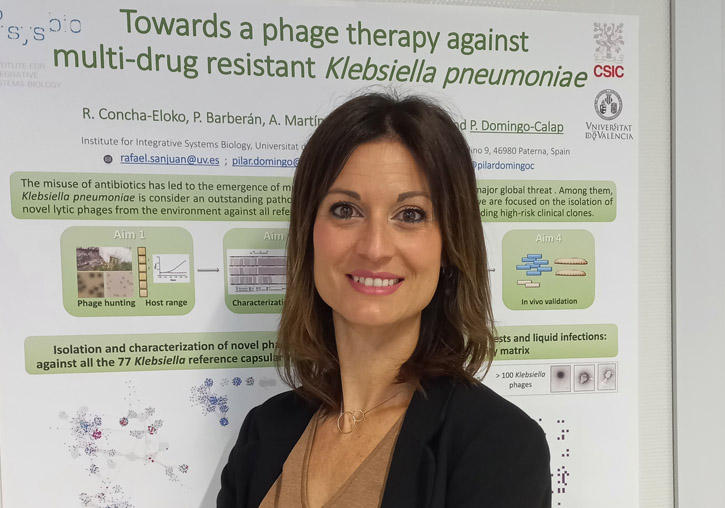The AmgenTransferCiència informative program about biotechnology begins in Valencian educational centres with Pilar Domingo
- Scientific Culture and Innovation Unit
- March 9th, 2022

Pilar Domingo Calap, researcher from the Institute for Integrative Systems Biology (I2SysBio, joint centre of the Universitat de València and the CSIC), is delivering the workshop Caçadors del virus this Thursday at the centre headquarters. It will be the first act of the III edition of the Amgen TransferCiència program in the Valencian Region, where young scientists will deliver lessons and workshops about genetics and biotechnology to 150 high school students.
The program, organised by the Catalan Foundation for Research and Innovation (FCRI) and the biopharmaceutical company Amgen, is looking for ways to encourage scientific vocation. Víctor Garrigós, Àngela Vidal and Alba Iglesias will participate in future workshops. Alba Arévalo and Àngela Vidal already participated in the activity that took place last Friday in Menorca.
Pilar Domingo will develop the workshop between 10am and 1pm, with the purpose of “showing the problematic of drug-resistant bacteria due to wrong usage of antibiotics and bacteriophages as antimicrobial therapy”, as she explains. Thanks to field research, students will learn how to isolate viruses that may combat multi-resistant bacteria, for which there is no treatment so far. This activity will be carried out on-site at the I2SysBio laboratories and students from IES Pou Clar (Ontinyent) will attend.
Pilar Domingo Calap, main researcher of the Environmental and Biomedical Virology group at I2SysBio, who is participating for the second consecutive year, highlights the importance of the event: “We need programs like Amgen transferCiència in order to convey to students the reality of scientific activities and the outreach of the developments that are being achieved”. This state level program carries out on-site genetic and biotechnology lessons that are combined with practical workshops and research sessions backed up by the use of experimentation kits. Students and teaching staff collaboratively perform activities that show scientific content in a much simpler way. In the Valencian Region, scientific staff have been selected by the UV and the I2SysBio and trained in didactics of sciences by the Health Sciences Educational Research Group from the Pompeu Fabra University in Barcelona.
Besides the aim of Domingo Calap’s workshop, Valencian students will also analyse genetic expression and genetic manipulation, amongst other concepts. They will also work on electrophoresis, meaning, the technique used in laboratories that consists in separating DNA, RNA, molecules and proteins based on their size and electrical charge. Other high schools of Valencia have confirmed their attendance to the program throughout the following weeks, such as IES Misericordia and IES Districte Marítim and there will be activities guided by Víctor Garrigós, Àngela Vidal and Alba Iglesias, from I2SysBio.
The project
Amgen TransferCiència started as a pilot program in the academic year of 2019-2020. Currently, 30 schools are participating, 15 of which are Catalan, 5 from the Valencian Region and some others from the Balearic Islands and Madrid.
Amgen is a pharmaceutical company committed to the development and production of biological medication for patients with severe illnesses or non-covered medical necessities. It focuses its efforts in cardiology, nephrology, bone health and oncohematology with the aim of improving the life quality of the patients. The treatments have benefitted more than 20 million patients around the world and hundreds of thousands of people in Spain, where it has been based since 1990.
The FCRI promulgates research and innovation among society in order to encourage scientific culture and scientific-technical vocation among young people, as well as entrepreneurship and public-private collaboration in research and development.
The FCRI board will be integrated by the Government of Catalonia, “La Caixa” Foundation, Naturgy, Endesa, IberCaja, BBVA, Esteve and Telefónica R&D. Besides the Institute for Integrative Systems Biology (I2SysBio, UV-CSIC), Barcelona Institute of Science and Technology (BITS) and the Mediterranean Institute for Advanced Studies (IMEDEA) will also collaborate, as well as the institutional delegation of the CSIC in the Autonomous Community of Madrid and the Health Sciences Educational Research Group from the Pompeu Fabra University in Barcelona.
















